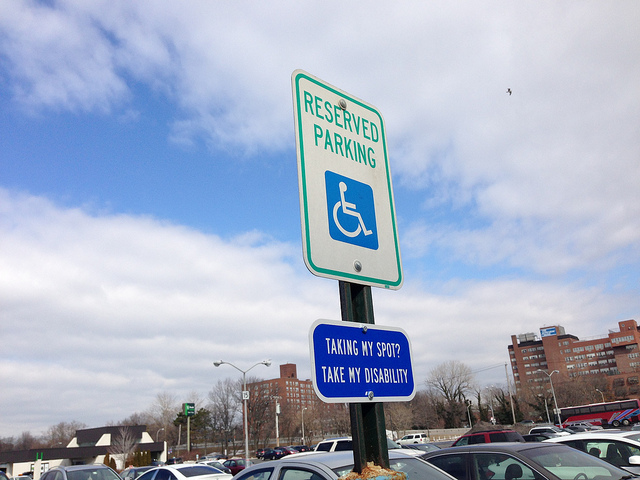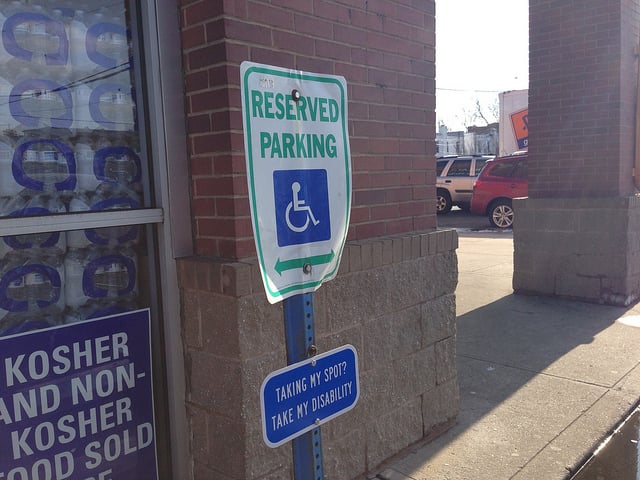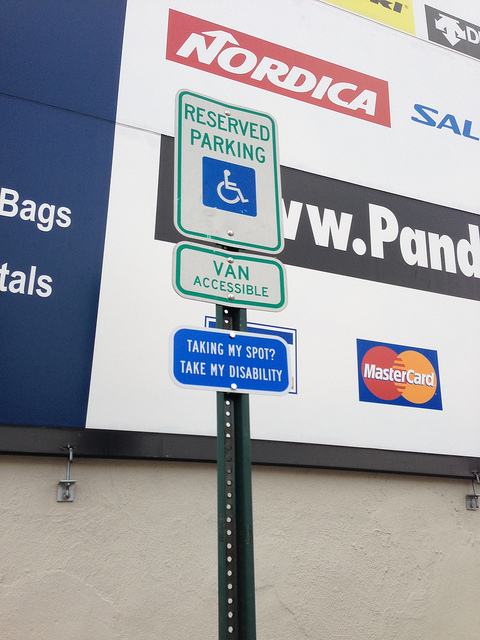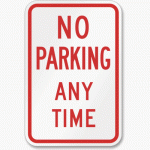Accessible parking sign guerrillas strike Brooklyn
It’s easy to forget that there was a time before the advent of so-called handicapped parking signs in the ’90s – in other words, a time before the Americans with Disabilities Act. Before then, parking was pretty much just parking, and you took what you could get, even if you had a disability. Today, there are three types – van accessible parking, accessible parking, and general admission parking (not an official term), and as a result, we afford people with a wide variety of mobility limitations just a little less space between themselves and the front door.
But because these prime spots are specifically set aside for people who need them, it’s tempting for people to skirt or break the rules outright – by acquiring a disability placard they don’t need, by simply parking in the accessible spot and hoping no one notices, or by borrowing someone else’s placard. In Los Angeles, a huge proportion of motorists carry placards, many of them ill-gotten. This can seem like a victimless crime, but it’s not – people who need those spots can be effectively shut out of the place of business they’re trying to get to. The failure is administrative (not enough monitoring), cultural (not enough intrinsic motivation to do the right thing), and persistent.
One of our staff had seen signs in France that said, “Si vous prenez ma place, prenez aussi mon handicap” – “If you take my spot, take my handicap, too.” Even if the language is a little awkward in the U.S., where “handicap” is disfavored, the sentiment is spot-on – it reminds motorists of who has choices and who doesn’t; it reminds the able-bodied not to abuse their power.
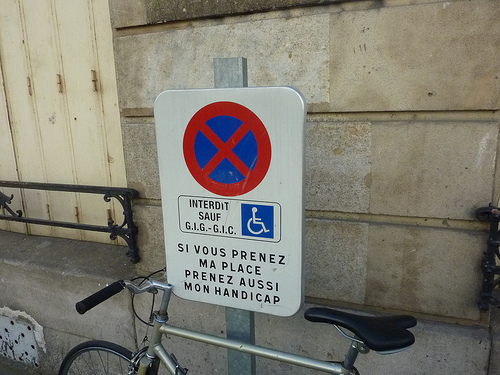
Roughly translated: if you take my spot, take my handicap, too. Via 石川 Shihchuan; Licensed under Creative Commons.
We decided to design something similar. One of the privileges of working for a sign company is that you get to make cool stuff every now and then. Our vendors are amazing at their jobs and easy to work with, and (if I may say so) our custom parking signs are easy to make, so after quick pow-wow about how best to translate the French, our team whipped up a sign with the slogan, “Taking my spot? Take my disability” in about three minutes, using exactly the same tools our customers have access to. We put the Taking my spot sign up on our website, and a few days later our vendors started making them for us.
We’d love to see these signs springing up everywhere – not because of sales, which will probably never be astronomical, but because of the message the sign communicates. Unfortunately, the entire world isn’t watching when we do stuff like this, so we decided to take matters into our own hands.
A few weeks ago, we went around Brooklyn and posted the signs – without permission, I should add – on a number of businesses’ disabled parking spots. We didn’t ask permission because we figured no one would really mind too much (we intentionally screwed the signs on loosely so they’d be easy to remove; plus, we were giving them free signage that showed that their businesses care about their customers). We did it during broad daylight so anyone could come up to us and tell us to go away if they wanted – we didn’t want to put on ski masks or anything (well, I sort of did, but only because I like ski masks). We did prep elaborate excuses for why we were there and what we were doing, but we never used them, because no one ever complained.

In an undisclosed location in post-industrial Brooklyn, a fearless MyParkingSign.com employee reminds the public not to be jerks.
The surprising thing was, I’d figured accessible parking violations wouldn’t be as big a problem in New York, where metered spots are free to people with disabilities (and metered spots are hard for anyone to get) – we were mostly putting up the signs to make a point. But everywhere we went, people came up to us to thank us for the signs.
In the vast, empty lot outside the Best Buy near Coney Island, one fellow thought we were officials of some sort, out to get him, and he rolled down his window, looking concerned – “I have my placard right here,” he said, alarmed. But once he got a look at the sign, he broke into a huge grin. “People take these spots all the time, even here, and there’s tons of spots everywhere,” he said, gesturing toward the sprawling asphalt with hundreds of free slots.
Later, an older man came up to us while we were putting a sign up on a pharmacy parking spot in Bensonhurst. “I see people take this spot all the time. Maybe your sign will work. Who are you putting it up for?” As we’d agreed, I just mumbled that we thought people with disabilities should get to park, too. My sharp-witted coworker said, “We’re doing it for you!” When it turned out that he didn’t have a disability, we were a little humbled, but carried on.
Eventually, we got to another pharmacy, this one in Sunset Park. Sure enough, we came upon an accessible spot with a guy without a placard parked in it. He was putting on his best tough-guy face and I decided to leave it alone, though I did notice a parking cop wandering blithely around just feet away. We put a sign up right behind his car (he didn’t notice).
It’d really tickle us to see people adopt the sign as an unofficial addition to their state-mandated International Symbol of Accessibility signs (the ISA is the familiar wheelchair symbol that stands for all people with disabilities – fairly or unfairly). We might have to put up a lot more semilegal signs before that starts happening. But our quiet, humdrum day of hooligan sign erection was just about the most satisfying day I’d ever had at any job – so don’t be surprised if you start seeing more of these around New York City.
Related Posts
Category: News











